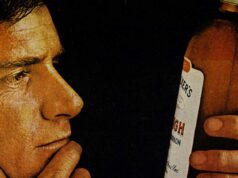When the white god Viracocha mysteriously appeared in South America, he taught the people he met all the “arts of civilization”: astronomy, geometry, agriculture and architecture.
He also taught them how to make wine from honey. When he left them, they slowly returned to their huts and gradually forgot most of what they’d learned. But to this day they still brew an alcoholic beverage called balche, based on the same recipe Viracocha taught their ancestors millennia ago. And who can blame them. I mean, those other arts are great and all, but what are they compared to a well-prepared gourd of honey wine?
Not surprisingly, there are many myths from around the globe in which the figures credited with founding the regional religion are also said to have been the inventors of alcoholic drinks. In northern Europe, the heaven-sent bringer of the booze was the god Odin. More than willing to suffer for his art, Odin sacrificed an eye for wisdom, and hung himself on a tree for nine days and nights to come up with the Runes. The runes were an early form of written communication, but also powerful magical symbols. After he got the magic tricks and wordy stuff out of the way (probably after boring the hell out of the natives) he got around to bringing them something they could sink their tongues into: mead, another alcoholic beverage made from honey.
Now, if you’ve ever tasted real mead before, you have to know these savages must have really wanted to get liquored. These early Vikings felt that hitting the mead brought them closer to their gods, and would regularly drink to gain Odin’s blessing before battles, as well as to heighten their fearlessness. Something that would later be called Dutch Courage.
Oftentimes the berserkers, the Viking version of the kamikaze (only with axes instead of airplanes) were not the bravest and most suicidal, but the most loaded. Unfortunately, the practice of boozing before battle sometimes led to less than favorable results—on the eve of one key battle the Vikings decided they wanted to be really sure they had Odin’s blessing and the next morning had such horrible hangovers their enemies were able to demoralize them by rattling their swords against their shields. The whole lot were then promptly massacred (if you’ve ever experienced a mead hangover, you’ll know they were probably grateful.) So the next time your wife complains about you coming home drunk, tell her you were merely out getting Odin’s blessing. But don’t blame me if you get massacred.
For the early Greeks, it was Bacchus who coughed up the wine recipe, and wine played a central role in his worship. Worshipping Bacchus essentially took the form of a drunken orgy. You can imagine it was a pretty popular religion in its day. The behavior of his followers (Bacchantes) was so notorious that to this day any sort of excessive hedonism is called “Bacchanalian.” His cult survived into Roman times, where he changed his name (probably for legal reasons) to Dionysus. The followers of Dionysus became so frenzied in their drunkenness, for party tricks they would sometimes behave like crazed animals and rip passersby limb from limb. Much like a frat party.
Even a religion as tame as Christianity is not without its booze lore. Surely of all of Christ’s miracles, turning water into wine is the most impressive (and back in the day, probably the most popular). Possessing the power to turn a pond into a party, it was no wonder Christianity spread like wildfire. You can almost hear the apostles saying, “Hey, JC, bringing that guy back to life was awesome and all, but, uh, could you do the water to wine thing again? The boys are getting thirsty.”
No teetotaler himself, Christ was much abused by his detractors because of his fondness of wine. At a time when most holy men made an ostentatious show of their piousness by fasting and depriving themselves of worldly pleasures, Christ was known to have a healthy appetite for good food and drink. His opponents might not of though much of it, but it no doubt endeared him to the chaps down at the wine pub. And to prove Christ liked to spread the joy around, he made wine an enduring part of orthodox ritual in the mock cannibalism of the Eucharist ceremony (still the central ritual of Catholicism.)
Oddly, in biblical lore it was that black sheep Cain who’s credited with the invention of wine. While his uptight brother was out sacrificing animals, Cain, the “man of the field”, busied himself inventing the plow and cultivating grains and grapes, from which he created the first form of vino. Early depictions of Cain portray him as a bearded man holding a sheaf of grain in one hand and vine-bearing grapes in the other. Though it’s popular these days to suppose the figures of Cain and Abel were purely mythological, a good deal of evidence exists to indicate they were historical figures. Many cultures in the Middle East report the appearance of a man who taught early communities how to build a plow, plant grain, enjoy music, cultivate grapes and, yes, make wine. Though the name of this figure varies for region to region, all the names echo titles held by Sumeria’s second king, Kan, a figure thought to be the historical prototype of biblical Cain. How’d he get to be king? I’ll bet the wine thing had a little to do with it.
Ancient people drank to get closer to their gods, to achieve a temporary state of ecstasy in which they could rise above their mundane day-to-day concerns and get a glimpse of something timeless and otherworldly. Native Americans did it with peyote, across the Atlantic they used booze. But you don’t have to want to get close to God to appreciate the wonder of alcohol. You don’t even have to be a believer. The effect is still the same—worldly cares and woes shrink away, one sip at a time. And we owe it all to that villain Cain.
In a better world Cain wouldn’t be regarded as the villain of biblical history, he’d be the first hero. Okay, so he smited his brother with a rock. Maybe Cain was a violent forerunner of PETA. Maybe Abel was riding him for “getting close to God” every night. Maybe he had a hangover.
And after all, would you rather live in Cain’s swinging scene of agriculture, wine and music or in Abel’s creepy world of killing sheep and setting them on fire?
You ask me, Cain got a bad rap.
—Boyd Rice










